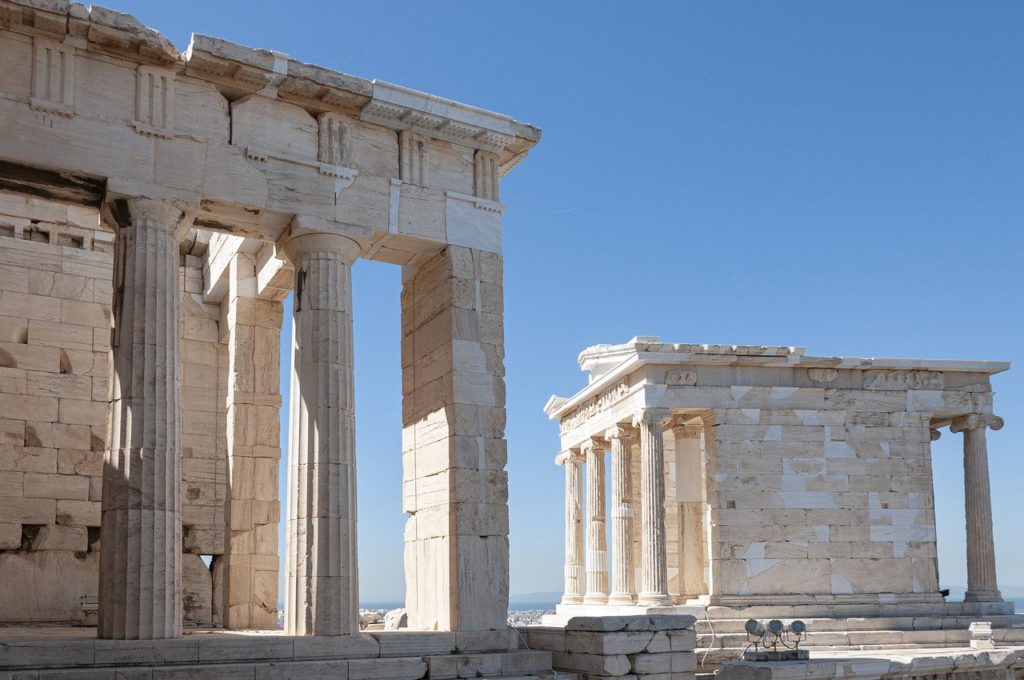International Greek Language Day Posted by Ourania on Feb 9, 2021 in Culture, News
Γεια σας! Today we celebrate the International Greek Language Day (Παγκόσμια Ημέρα Ελληνικής Γλώσσας). In the post you can read seven facts about the Greek language.
#1. Ελληνιστική Κοινή (Koine Greek) was the first international language (lingua franca). It is the language of the New Testament (Καινή Διαθήκη) and the Gospels (Ευαγγέλια).
#2. We still use words which origins date from the Homeric age (1200-800 BCE). Some words are used in English too.
Examples:
νόσταλγία: nostalgia. It comes from νόστος, which means return to homeland and άλγος, which means pain.
Αλέξανδρος: Alexander. The verb αλέξω dates from the Homeric age and it means to protect or to push back. The name Αλέξανδρος means the one who beats off the men (i.e. his enemies).
#3. Modern Greek is a flexible language. Note the following sentence:
Σηκώνεται κάθε πρωί στις έξι για να πάει στη δουλειά του.
Για να πάει στη δουλειά του σηκώνεται κάθε πρωί στις έξι.
Κάθε πρωί στις έξι σηκώνεται για να πάει στη δουλειά του.
Even if we change the word order, these sentences have the same meaning: Every day he gets up at six in order to go to work.
#4. When speaking, most people use non-verbal elements, such as gestures and facial expressions.
#5. The politeness form (πληθυντικός ευγενείας) is “borrowed” from the French language. When we address someone we don’t know or an older person, we use the second-person plural.
Example: Με συγχωρείτε, μήπως ξέρετε πού είναι η στάση του μετρό; Excuse-me do you know where the metro station is?
There was no politeness form in ancient Greek.
#6. The language spoken now in Greece is called δημοτική (demotic). It is the language taught in schools since 1976.
#7. According to UNESCO, three Greek dialects are endangered: η Ποντιακή διάλεκτος (Pontic Greek, spoken in some areas in Macedonia and in the Pontus area), η Τσακώνικη διάλεκτος (Tsakonic, spoken in the Eastern Peloponnese), η Καππαδοκική διάλεκτος (Cappadocian Greek, spoken in some areas in Macedonia), η Γραικάνικη διάλεκτος (Grico, spoken in some villages in Southern Italy).
If you want to share your thoughts about Greek or if you want to write about the reasons for which you learn Greek, feel free to leave a comment!
You can watch a video with children from all over the world who say why they learn Greek here.

Build vocabulary, practice pronunciation, and more with Transparent Language Online. Available anytime, anywhere, on any device.





Comments:
Carl Simpson:
I have a friend on the island of Crete he is a primary school teacher i want to learn some Greek to get by as i have bought a property on Crete. He told me to study ,learn Latin to help me with learning Greek some people don’t agree i would like your opinion ….regards Carl
Ourania:
@Carl Simpson Thank you for your comment. I don’t think it’s a good idea to learn Latin. Latin would be useful only if you wished to study ancient languages, such as ancient Greek. Just focus on modern Greek. It is not an easy language to learn and it takes time (you cannot learn Greek in 6 months, unless you study eight hours per day) and effort. Fortunately, there are many resources, such as online courses, teachers, books and applications so you can choose the one that works best for you.
Heinrich:
I love and learn modern Greek because it shows continuity since the times of Omiros, it is the basis of Western civilization and one of the most beautiful languages. Besides that, I love and admire the Greeks for their generosity and hospitality.
Ourania:
@Heinrich Thank you for your comment. I’m glad you enjoy learning Greek! I agree that its a beautiful language, although my opinion doesn’t count 🙂
Alexandra:
“The Greek sentence has an almost architectural structure and sounds like a song.
It is a language in which it is equally good both to command soldiers in the field and profess love.”
(Vojtech Zamarovsky, a Slovak writer)
I definitely agree!
Ourania:
@Alexandra Very nice comment! Ευχαριστώ 🙂